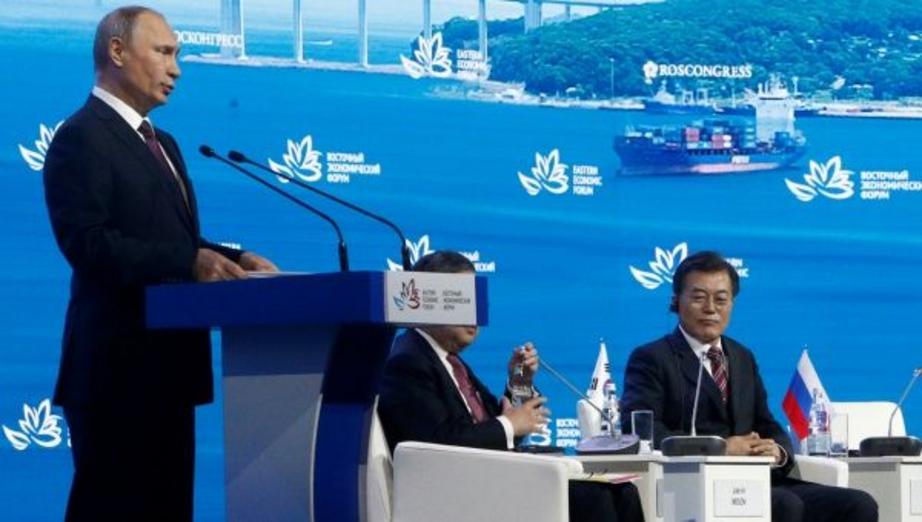Putin offers end to crisis
... through joint projects uniting Russia, North and South Korea
Rather than inviting Pyongyang "to a cemetery," economic integration would strengthen stability and trust while developing the region, Putin said.
Russian President Vladimir Putin has proposed a conciliatory solution toward resolving the crisis on the Korean peninsula, noting that the incorporation of North Korea into joint development projects across the region could soothe the frayed nerves caused by the region's militarization and the ratcheting-up of tensions.
Such a move would not only serve mutually-beneficial economic interests of the divided Korean peninsula and Russia, Putin noted, but would help build trust and strengthen stability in the region.
The proposal, delivered Wednesday during a plenary session at the Eastern Economic Forum in Vladivostok and during a press conference with South Korean President Moon Jae-In the same day, comes in sharp contrast to bellicose U.S. calls for a further tightening of U.N. sanctions on Pyongyang after it successfully tested a hydrogen warhead capable of being mounted on an intercontinental ballistic missile.
"North Korea needs to be gradually involved in regional cooperation, Russia has some specific proposals that everyone knows about, which include building a joint railway connecting the Trans-Siberian Railway and Korean railways through North Korea, as well as the development of pipeline transport and North Korea’s ports to name a few," the Russian leader told the plenary meeting.
"We have much to offer and much to work on," Putin added. "At the same time, creating military atmosphere and raising hysteria is counterproductive and will lead nowhere," the Russian leader stressed.
Russia has consistently supported the goal of denuclearization on the Korean peninsula and has opposed Pyongyang's H-bomb test, but stresses the futility of notions that further military tensions could resolve the crisis.
"But it they do what they do, while they are not silly at all, it means that they expect a certain response from their opponents," Putin noted. "So why do you play along?"
A willingness to ensure the security of North Korea conditional on mutual compromises and acceptable yet firm parameters for cooperation is needed to find a peaceful solution, the Russian leader added.
"I assure you, if this path is adopted, then the situation in the region will gradually change, as well as relations between the Pyongyang and Seoul, and we will be able to expect some new steps," Putin said. "However, it is impossible to scare them,"
After all, he sardonically noted, the North Korean leadership presently feels that the next proposal put forward by the international community will be an invitation “to a cemetery.” Of course, “they will not agree to that.”
In an earlier press conference with South Korean President Moon, Putin raised similar ideas while urging regional leaders to “summon the presence of mind and to avoid taking steps that could escalate tensions.” In response, Moon noted his government's appreciation of Russia's support for the cause of building “a lasting peace on the Korean peninsula and improved relations between the two Korean states.”
Hours after Sunday's nuclear test, U.S. President Donald Trump logged onto Twitter to denounce North Korea as an embarrassment to China, which he claimed was "trying to help (end the crisis) but with little success."
He later pontificated about the possibility of stopping all U.S. trade with any country that maintained commercial relations with North Korea. Experts have scoffed at the former reality television host's proposal as hardly feasible and a likely bluff from the bombastic U.S. leader.
Despite that, U.S. Ambassador to the U.N. Nikki Haley appealed to the Security Council the following day to impose the strongest possible sanctions against Pyongyang, which she characterized as “begging for war.”
She also reiterated Trump's saber-rattling Tweets, adding that "every country that does business with North Korea" should be seen "as a country that is giving aid to their reckless and dangerous nuclear intentions” and could face sanctions.
In response, Russian Ambassador to the U.N. Vasily Nebenzya urged the "need to maintain a cool head and refrain from any action that can escalate tensions."
Russia and China both have extensive, if intermittently strained, trade links with Pyongyang, which enjoys considerable wealth in rare earth minerals.
Seoul's new leadership is also in favor of boosting efforts toward reintegrating the divided peninsula, despite its traditional role in the region's security architecture as a junior partner to the United States that has been under military occupation since 1945.

